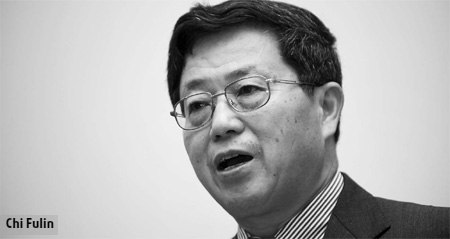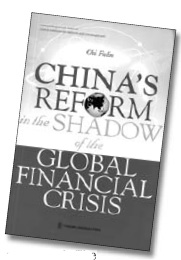


A think tank professional has good reason to stay close to centers of politics such as Washington, DC, and Beijing. But some prefer to be based far from the world's political elite.
Senior political advisor Chi Fulin two decades ago left Beijing to start a think tank, the China Institute for Reform, in the island province of Hainan.
"Hainan, one of the frontlines of China's reform drive, is rich in fresh ideas," Chi recalled about his decision during an interview with China Business Weekly.
The island province was named one of several special zones, including Shenzhen, by the central government in the 1980s.
Located far from Beijing, the institute led by Chi has elevated its research and reputation in the current global financial crisis.
Just one day after President Hu Jintao attended the first G20 leaders summit in Washington, DC, last year to deal with the financial turmoil, Chi's institute published the UN-sponsored China Human Development Report.
Chi, chief author of the report, said that once a mature public service system is established, public service will become a driving force in the sustainable development of China and lessen the impact of future financial downturns.
The government invested in infrastructure nationwide with a 4 trillion yuan stimulus package last November that is building new roads, bridges and railways to stimulate the economy.
Chi and other leading economists became concerned that China could not manage the financial crisis well without deep-rooted reform measures.
A call for more change

A five-expert panel led by Chi in March outlined a proposed reform package in the book, Crisis Challenges Reform, saying the reform measures should be implemented to make China's stimulus program more effective.
The need for price deregulation of resource products and shrinking the central government's monopoly of key industries topped the 14-point reform package prepared by renowned economists such as Chi and Chang Xiuze, an economist affiliated with the National Development and Reform Commission.
Released prior to the G20 summit in London, Chi and his colleagues' insights were widely publicized. The UK-based magazine Economist declared the proposed measures fundamental to stimulating China's economy and domestic consumption.
"The suggestions in the reform package have been gradually materializing," Chi said.
In the first half of this year, China started to link its refined oil prices to the fluctuations of the global market. And the government has also speeded up reforms to the country's healthcare system in cities and rural regions.
Post-crisis ideas
Since the middle of this year, when signs of an economy recovery began appearing in China and other countries, Chi has led a panel of economists to think about the country's reform in the post-crisis era.
Their ideas were included in the book, China's Reform in the Shadow of the Global Financial Crisis, which was published by Beijing-based Foreign Language Press.
"I am still stressing the urgency of reform in the book," Chi said. "That's a lasting driver for China, which is on the way to a market economy."
Chi said demand for Chinese output is decreasing globally and at home. China wants to move to the upper end of the consumption chain after three decades of development, he said.
In the book, Chi said he believes that China faces tremendous challenges to transform its pattern of economic development.
Three decades of economic reform have led China to a new stage of development in terms of its society and economy. With the country advancing more rapidly, many problems and challenges have emerged, Chi said.
Chinese leaders should rethink the country's reform package amid changing global and domestic situations and take steps to move toward a market-oriented economy by 2020, the senior political advisor said.
Reform measures should speed up urbanization, break down industry monopolies by the State, deregulate energy, offer equal social welfare for rural residents and urban dwellers, and improve the government's efficiency, he said.
Radical measures
"Our top leaders should take quicker and radical measures in these endeavors within the coming two or three years. By doing so, China can do a better job in post-crisis management, as well," Chi said.
"Looking at the goal of realizing a market economy by 2020, we cannot afford to lose the time window of the next two or three years," he said.
Chi, who is also a member of the Chinese People's Political Consultative Conference, the country's highest political advisory body, praised the government's swift response to the current financial crisis.
"There is no doubt China will soon overtake Japan to become the world's biggest economy after the United States. But we should be realistic about our strengths," Chi said.
It might take about two decades for China to become an economic power "if all goes smoothly", he said.
Chi also said the government should step up efforts to encourage overseas investment and trade, which should go hand in hand with the country's efforts to internationalize its currency.
"The most important thing is that there is consensus among the leadership to reform, and they are acting now," Chi said. "What I am advocating is to carry on the momentum."
(China Daily 10/19/2009 page2)













